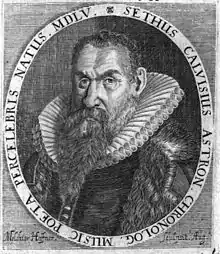Sethus Calvisius
Sethus Calvisius or Setho Calvisio, originally Seth Kalwitz (21 February 1556 – 24 November 1615), was a German music theorist, composer, chronologer, astronomer, and teacher of the late Renaissance.

Biography
He was born into a peasant family at Gorsleben in present-day Thuringia. By the exercise of his musical talents he earned money enough for the start, at Helmstedt, of a university career, which the aid of a wealthy patron enabled him to continue at Leipzig. He became director of the music-school at Pforta in 1572. In 1594 he was transferred to Leipzig in the same post, including directing the Thomanerchor at the Thomaskirche.[1] He retained this post until his death in Leipzig, despite the offers successively made to him of mathematical professorships at Frankfurt and Wittenberg.
Calvisius was also a significant astronomer: in his Opus Chronologicum (Leipzig, 1605, 7th ed. 1685) he expounded a system based on the records of nearly 300 eclipses. An ingenious, though ineffective, proposal for the reform of the calendar was put forward in his Elenchus Calendarii Gregoriani (Frankfurt, 1612); and he published a book on music, Melodiae condendae ratio (Erfurt, 1592). He composed choral pieces including Unser Leben währet siebzig Jahr.[1]
Works
- Harmonia cantionum ecclesiasticarum, Kirchengesänge u. geistliche Lieder D. Lutheri u. andrer frommen Christen, Mit 4 Stimmen contrapunktweise richtig gesetzt. Leipzig 1597, 1598, 1604, 1612 and 1622
- Melopoiia sive melodiae condendae ratio. Erfurt 1592 and 1630
- Compendium musicae practicae. Leipzig 1594, also published in 1612 as Musicae artis praecepta
- Exercitatio musica tertia. Leipzig 1611
- Exercitationes musicae duae. Leipzig 1600
- Hymni sacri Latini et Germanici. Erfurt 1594
- Der Psalter Davids., Cornelius Becker (ed.), Leipzig 1605
- Der 150. Psalm Davids. Leipzig 1615
- Opus chronologicum ex autoritate s. scripturae ad motum luminarium coelestium contextum. Leipzig 1605 (first edition), Frankfurt 1685 (6th edition)
- Elenchus calendarii Gregoriani. Leipzig 1613
- Formula calendarii novi. Leipzig 1613
- Thesaurus latini sermonis. Leipzig 1614
- Enchiridion lexici Latino-Germanici. Leipzig 1614
- Tricinia, Auserlesene deutsche Lieder., Paul Rubardt (ed.), 1949
- 10 Motetten, Albrecht Tunger (ed.), 1965.
- Biciniorum libri duo, Leipzig 1612
Notes
- Motette in der Thomaskirche. Sonabend, den 20 September 2008. Leipzig: Merkur.
References
 This article incorporates text from a publication now in the public domain: Chisholm, Hugh, ed. (1911). "Calvisius, Sethus". Encyclopædia Britannica (11th ed.). Cambridge University Press. This work in turn cites:
This article incorporates text from a publication now in the public domain: Chisholm, Hugh, ed. (1911). "Calvisius, Sethus". Encyclopædia Britannica (11th ed.). Cambridge University Press. This work in turn cites:
- V. Schmuck, Leichenrede (1615)
- J. Bertuch, Chronicon Portense (1739)
- F. W. E. Rost, Oratio ad renovendam S. Calvisii memoriam (1805)
- J. G. Stallbaum, Nachrichten über die Cantoren an der Thomasschule (1842)
- Arrey von Dommer (1876), "Calvisius, Sethus", Allgemeine Deutsche Biographie (ADB) (in German), 3, Leipzig: Duncker & Humblot, pp. 716–717
- Poggendorff, Biog.-Litterarisches Handwörterbuch
External links
| Wikimedia Commons has media related to Sethus Calvisius. |
- Free scores by Sethus Calvisius in the Choral Public Domain Library (ChoralWiki)
- Free scores by Sethus Calvisius at the International Music Score Library Project (IMSLP)
- Sethus Calvisius at the Mathematics Genealogy Project
